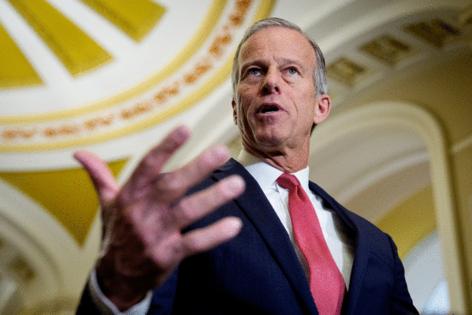Republicans move to change Senate rules to speed confirmation of some nominees
Published in News & Features
WASHINGTON — Senate Majority Leader John Thune took the first procedural step this week toward changing the chamber’s rules to speed up the confirmation of lower-level Donald Trump nominees, saying the move is necessary to combat obstruction from Democrats.
Democrats this Congress have forced the GOP majority to use valuable floor time on procedural votes, slowing down the confirmation process and leaving spots unfilled in the Trump administration.
Republicans argue Democrats are destroying a Senate tradition of quickly confirming noncontroversial nominees regardless of the party of the president. But Democrats contend the posture is a needed negotiating tool as Trump has burned through government norms and at times embraced an authoritarian attitude of executive power.
Thune, R-S.D., late Monday asked for immediate consideration of an executive resolution that would authorize the en bloc consideration in executive session of certain nominations. In order to place it on the calendar, he said, he objected to his own request.
The resolution now lies over one calendar day. A copy of the resolution was not immediately available Monday night.
Thune said in a floor speech earlier Monday that after Trump’s eight months in office this term, no civilian nominee has been confirmed by voice vote.
He compared that to other presidents: George W. Bush and Barack Obama each had 90% of their civilian nominees confirmed on voice vote, and Trump in his first term and Biden had more than 50%.
“It’s time to take steps to restore Senate precedent and codify in Senate rules what was once understood to be standard practice, and that is the Senate acting expeditiously on presidential nominations to allow a president to get his team into place,” Thune said.
Thune said Republicans would seek to speed up confirmations. The change would apply to nominees at the sub-Cabinet level and not Article III judicial nominees, he said.
The objective, he said, was “confirming groups of nominees all together so the president can have his team in place and so the Senate can focus on the important legislative work in its charge.”
The Senate would have to take another 600 votes before the end of the year to clear the current backlog of nominees on the calendar and at committee, Thune said.
“That’s more votes than this record-breaking Senate has taken all year up until now,” Thune said. “There is no practical way that we could come close to filling all the vacancies in the four years of this administration, no matter how many hours the Senate works.”
Minority Leader Charles E. Schumer, D-N.Y., slammed the GOP effort, warning Republicans that they would come to regret the decision to “go nuclear.”
“What will stop Donald Trump from nominating even worse individuals than we’ve seen to date, knowing this chamber will rubber-stamp anything he wishes?” Schumer said.
The move is the latest in a history of changing Senate rules to lower vote thresholds in the chamber.
Under then-Majority Leader Mitch McConnell, R-Ky., Republicans in 2017 removed the 60-vote requirement for confirming Supreme Court justices as they sought to confirm Neil M. Gorsuch.
Years before, in 2013, Senate Democrats did away with that vote threshold for other judicial nominees.
Since the start of the second Trump administration, some Senate Democrats have sought to use the lower-level confirmations as a pressure point.
In May, Schumer announced a hold on all Justice Department nominees after the administration agreed to accept a plane from Qatar. That move from Schumer prevented U.S. attorney nominees from moving forward on voice votes.
The same month, Sen. Richard J. Durbin of Illinois, the top Democrat on the Judiciary Committee, put a hold on Trump’s pick for U.S. attorney for the Southern District of Florida.
Durbin also warned he might do so for other U.S. attorney nominees who reach the Senate floor.
In February, Sen. Brian Schatz, D-Hawaii, announced he was putting a blanket hold on all Trump administration State Department nominees over the shuttering of the U.S. Agency for International Development.
©2025 CQ-Roll Call, Inc., All Rights Reserved. Visit cqrollcall.com. Distributed by Tribune Content Agency, LLC.







Comments